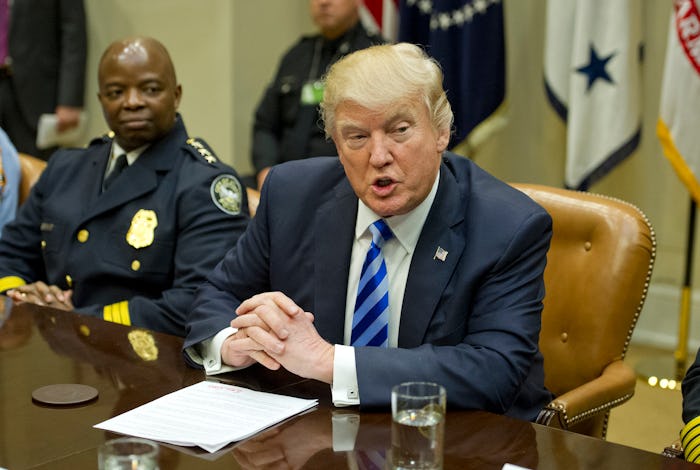News

The White House Just Made An Unprecedented Decision
On Friday, the Trump administration announced that it would not be voluntarily releasing the names of White House visitors, reportedly due to "grave national security risks and privacy concerns," according to The Washington Post. Releasing visitor records was a key initiative put in place by President Obama, and the White House disclosed over 6 million records during his time in office. The Trump administration's decision to roll back a measure that helped increase government transparency should worry anyone who believes politicians need to be held accountable, and the move is already drawing criticism from transparency experts.
From now on, if anyone wants to know who's been rubbing elbows with those in the White House, they will have to file a Freedom of Information request — and even then, a response isn't guaranteed. Requests can be filed for people visiting offices in the White House that are legally classified as separate agencies (such as the Office of Management and Budget). The White House will decide on a case-by-case basis if they want to disclose who visits the president, vice-president, or any senior staff.
Any visitor logs that the White House decides it wants to keep secret will remain that way until at least five years after President Trump leaves office, as per presidential record rules. Trump communications director Mike Dubke only announced the change in regulation after three organizations filed a lawsuit against the White House for refusing to release the names of visitors, according to Mother Jones.
The thing is, knowing who government leadership is interacting with is extremely important — especially in an administration that's as rife with conflicts of interest as Trump's is. (Multiple people in his administration have significant ties to fossil fuel industries, health care companies, and manufacturing industries, according to The Atlantic.) Being able to see who is stopping by the White House is a key way to monitor which lobbyists and donors trying to curry favor with the people who lead the country and hold those politicians accountable.
"The only excuse for this policy is that the Trump administration has something to hide," David Donnelly, president of government watchdog group Every Voice, told The Washington Post on Friday. "This kind of secrecy will allow big donors, lobbyists and special interests to have unknown levels of influence in the White House."
Romper reached out to the White House for comment on the measure, but did not hear back immediately.
The visitor logs Obama opened up to the public helped Washington Post journalists discover that lobbying was still very much alive in the White House in 2012, and it seems privacy and security concerns were avoided fairly easily by keeping certain names out of the visitor logs (such as the names of Obama's daughters' friends or potential Supreme Court nominees).
"Elected officials work for the people and we deserve to see government business conducted in transparent daylight," Faiz Shakir, political director of the American Civil Liberties Union, said in a statement to Reuters.
At his inauguration speech in January, Trump told Americans, "We are transferring power from Washington, D.C. and giving it back to you, the people." But his latest move promises to do the exact opposite of that. Americans had to work hard to get Obama to voluntarily disclose the names of White House visitors — there were multiple lawsuits involved — and the Trump administration is now effectively erasing that work. Drain the swamp, indeed.